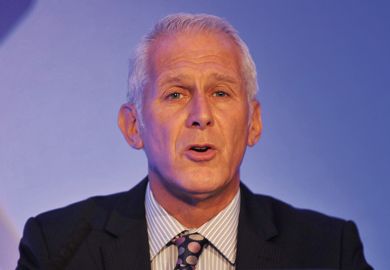The last Labour government “didn’t find a sustainable way forward for the financing of higher education”, while the current £9,000 fees system is a “random and unprincipled” method of funding universities, according to graduate tax supporter Ed Balls.
The former Labour shadow chancellor, who lost his seat at the general election last year, made the comments in an interview with Times Higher Education after taking up a visiting professor post at the Policy Institute at King’s College London.
Jeremy Corbyn, the new Labour leader, said during his leadership campaign that he wanted to scrap tuition fees and reintroduce maintenance grants – a policy that he costed at £10 billion a year.
The comments from Mr Balls, who is co-teaching a module on The Treasury and Economic History since 1945 at King’s, indicate that he still sees a graduate tax as the best solution.
Asked about the policy successes and failures that he would identify from his time in the Treasury, which initially ran from 1997 to 2004 as chief economic adviser, Mr Balls included tuition fees as a regret.
“We clearly didn’t find a sustainable way forward for the financing of higher education,” he said. “I’m afraid that’s also a bit of a blot on Labour’s copybook.”
Mr Balls, who has also taken up a post at Harvard University and recently took over as chairman of Norwich City Football Club, called for a graduate tax during his Labour leadership campaign in 2010.
Speaking to THE, he recalled being on BBC One’s This Week programme with former Conservative Cabinet minister Michael Portillo that year.
“And Michael Portillo said the reason he was against a graduate tax was it would make it much, much harder to have variable fees – different for each institution,” continued Mr Balls.
“And I said the reason I was in favour of a graduate tax was I absolutely thought students should make a contribution, but I was very wary indeed of where allowing variable fees set by different institutions…would take us.”
Labour went into the 2015 general election with a policy to lower tuition fees from £9,000 a year to £6,000.
“We came up with some proposals before the election, which clearly didn’t win universal support,” said Mr Balls. “They were never, ever presented as a solution. They were a step along the way.
“But you have to stand back and say: we need a system of higher education which really finances excellent institutions for the UK, which means that those students with talent go to universities to do what they want to do regardless of…affordability and [their] perception of affordability, and which is fair to the taxpayer.
“And you’d have to look at the current system – I don’t believe it’s succeeding on any of those fronts.”
Mr Balls called the write-off on student loans, which will eventually be paid by the government and has been subject to fluctuating estimates since the £9,000 system became policy in 2010, “a random and unprincipled way to finance higher education. And the fact it’s so untransparent at the moment, I just think is very flawed.”
POSTSCRIPT:
Print headline: ‘On funding, we didn’t find a sustainable way forward’
Register to continue
Why register?
- Registration is free and only takes a moment
- Once registered, you can read 3 articles a month
- Sign up for our newsletter
Subscribe
Or subscribe for unlimited access to:
- Unlimited access to news, views, insights & reviews
- Digital editions
- Digital access to THE’s university and college rankings analysis
Already registered or a current subscriber?





